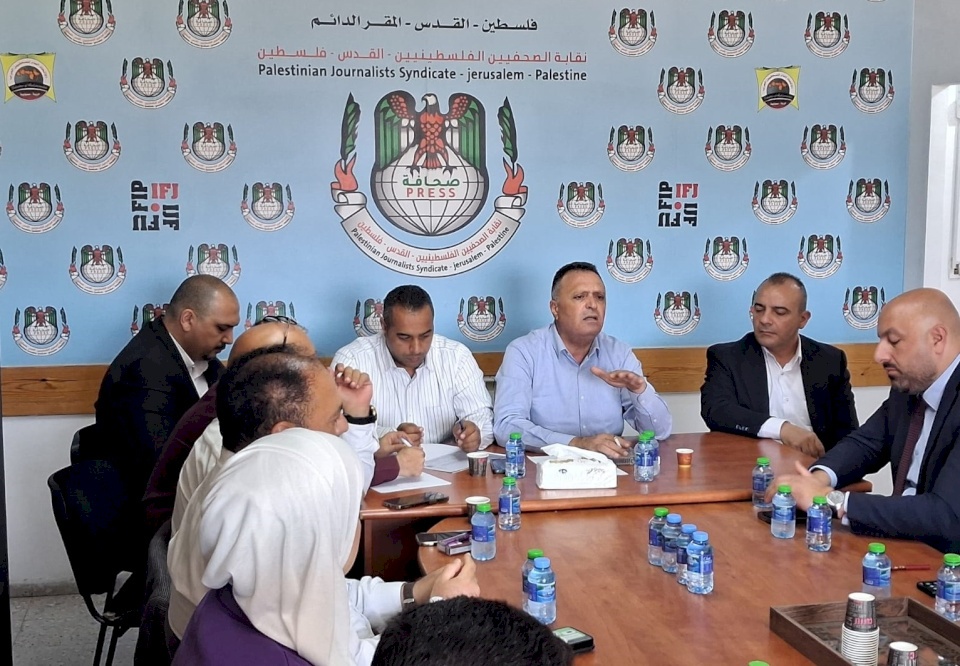
Palestinian Journalists' Union Holds Consultative Meeting for Economic Journalists Network
SadaNews - The Palestinian Journalists' Union held a consultative meeting today, Monday, for journalists affiliated with the Economic Journalists Network, at the union's headquarters in Ramallah, with the attendance of 30 journalists interested in economic affairs and representatives from active economic institutions in Palestine, along with Deputy Union President Omar Nazzal and several members of the union's general secretariat.
During the opening of the meeting, the union's president, Nasser Abu Bakr, emphasized the importance of activating the Economic Journalists Network and the role it has played and will continue to play in the upcoming phase to serve national economic institutions and provide economic information in the best possible way for our people.
He stressed the importance of the Economic Journalists Network as one of the active and important committees of the journalists' union, and he listened to feedback from fellow journalists on ways to activate the network and the best means to serve economic journalists.
Abu Bakr expressed his gratitude and appreciation to the members of the Economic Journalists Network who handed over their duties last year, valuing their efforts in serving journalists and the economic sector.
He pointed out that the union has been able to establish three solidarity media centers in the Gaza Strip during the war, in light of the absence of media institutions, reaffirming the possibility of opening a fourth center in the city of Gaza, despite the destruction of most media offices.
He confirmed that the current meeting is a friendly invitation for consultation, and that everything agreed upon will be implemented in accordance with the law, calling for holding bilateral or trilateral meetings as needed.
He indicated that the union includes many committees, and there are no parallel bodies; the Economic Journalists Network is not a separate entity but a committee within the union, subject to its internal regulations.
The union president highlighted the desire of economic institutions to provide support for training courses and workshops specifically for journalists and students, which enhances the importance of activating the network.
He stated that all committees should participate in elections to renew their members, and that the financial report was approved by the accountant and unanimously ratified by the general secretariat.
For his part, Nazzal confirmed that the Economic Journalists Network had a prominent role in the past and should build on what it has achieved in order to complete its mission, emphasizing the importance of this network's work in the current phase, especially since the economy in Palestine is linked to politics.
Karim Abu Rubb, director of Al-Mu'asser Radio and a member of the network, stated that the Economic Journalists Network should play an important role in the upcoming phase, and that the network will serve as a media umbrella for all national economic institutions.
Waleed Nassar, director of Ajyal Radio, stated that it is essential to activate the role of the Economic Journalists Network, to provide support for field journalists and training for new colleagues who wish to work in the field of economic journalism.
In the same context, journalist Asef Nufal emphasized that it is necessary to build on the internal regulations for the network, stemming from the internal system of the journalists' union, and the importance of including journalists working in the economic field into the network.
Imad Freij from Wafa Agency spoke about the necessity of preparing a committee to register membership and update the internal regulations of the network as soon as possible, and to relaunch the Palestine Economic Journalism Award.
Ahmed Abu Aliya, director of public relations at the Palestinian Monetary Authority, mentioned that economic institutions prefer to deal with the Economic Journalists Network to publish their news instead of communicating with journalists individually.
For his part, Ahmad Safi, media officer at the Palestine Stock Exchange, stated that a supportive committee of public relations staff in economic institutions should be formed to support and consult with colleagues in the Economic Journalists Network, to serve the Palestinian public on economic issues.
The attendees unanimously agreed on the necessity of reactivating the Economic Journalists Network to serve the economic ecosystem and the journalists and students interested in economic affairs, stressing that the network's suspension has harmed economic institutions and weakened their ability to convey their media messages.
They affirmed the need to expand membership to include all economic journalists and to work quickly to rebuild the network on democratic and legal foundations, as it was agreed that the institution is more important than individuals, and that the network must continue to serve the public interest.

مستعمرون يعتدون على طفل والاحتلال يعتقل مسنا في مسافر يطا

Kashif Observatory Concludes Specialized Training in Information Verification for Palestin...

Awqaf: 28 incursions into Al-Aqsa and 57 prohibitions on the call to prayer at the Ibrahim...

Civil Organizations: Opening the Rafah Crossing Does Not End the Tragedy.. The Internation...

Settlers Cut Down Dozens of Olive Saplings in Bourin South of Nablus

Occupations Extends Its Aggression on Tulkarem and Nur Shams Camps Until the End of March...

Al-Natsheh: The Eighth General Conference of 'Fatah' Must Be a Step Forward Towards Revivi...

